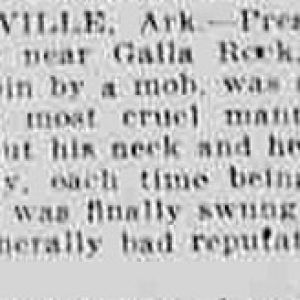calsfoundation@cals.org
Presley Oats (Lynching of)
Although many lynchings in Arkansas occurred in connection with serious crimes, real or alleged, there were some people lynched for trivial reasons. On May 13, 1897, an African-American man named Presley Oats was, according to national reports, dragged from his home in Pope County and lynched for supposedly stealing a ham.
This incident preceded the Atkins Race War, which began approximately two weeks later. It was, however, indicative of the racial animus caused by the recent influx of African Americans into the county. Many of these new arrivals accepted lower wages for farm work and work in the lumber mills, causing resentment among area whites.
Although one newspaper account of the incident referred to Presley Oats as an “old negro,” there is an eight-year-old Presley Oates in Pope County at the time of the 1880 census, living at Galla Rock with his farmer father, Elly Oates. Galla Rock (also known as Galley Rock), was a town situated near the Arkansas River bluff of the same name. If it is the same person, Presley Oats would have been in his mid-twenties at the time of the lynching.
According to the New York Times, Presley Oats was taken from his home by a mob of masked men on May 13. The men allegedly found a ham in Oats’s house that had been stolen from the smokehouse of a member of the mob. The mob “concluded that the man’s life must pay the forfeit.” Oats was hanged in a nearby swamp and shot numerous times. Before leaving, the mob attached a sign to Oats’s body, reading “A Warning to Stealers of Hog Meat.”
The Houston Daily Post carried a slightly different account. According to its reporting, Oats was hanged for having a bad reputation: “After the mob took him from his cabin, he was stripped and beaten in a most cruel manner. A rope was tied about his neck and he was swung up repeatedly, each time being beaten by the mob. He was finally swung up and left to die.”
In a January 27, 1898, editorial, however, the Arkansas Democrat objected to the appearance of this lynching on a list compiled by the Chicago Tribune. The editorial quotes J. T. Bullock, editor of the Russellville Democrat, who describes the narrative of the lynching as “a pure lie out of whole cloth,” adding, “No such lynching ever occurred, and in fact Pope county is free and has been for a number of years from any stain of that character, however much our northern contemporaries may bleat and blow.”
For additional information:
“The Chicago Tribune’s Statement.” Arkansas Democrat, January 27, 1898, p. 2.
“Negro Hanged for Stealing.” New York Times, May 15, 1897, p. 7.
“Short News Stories.” Houston Daily Post, May 15, 1897, p. 5.
Nancy Snell Griffith
Clinton, South Carolina


 Oats Lynching Article
Oats Lynching Article 



Comments
No comments on this entry yet.